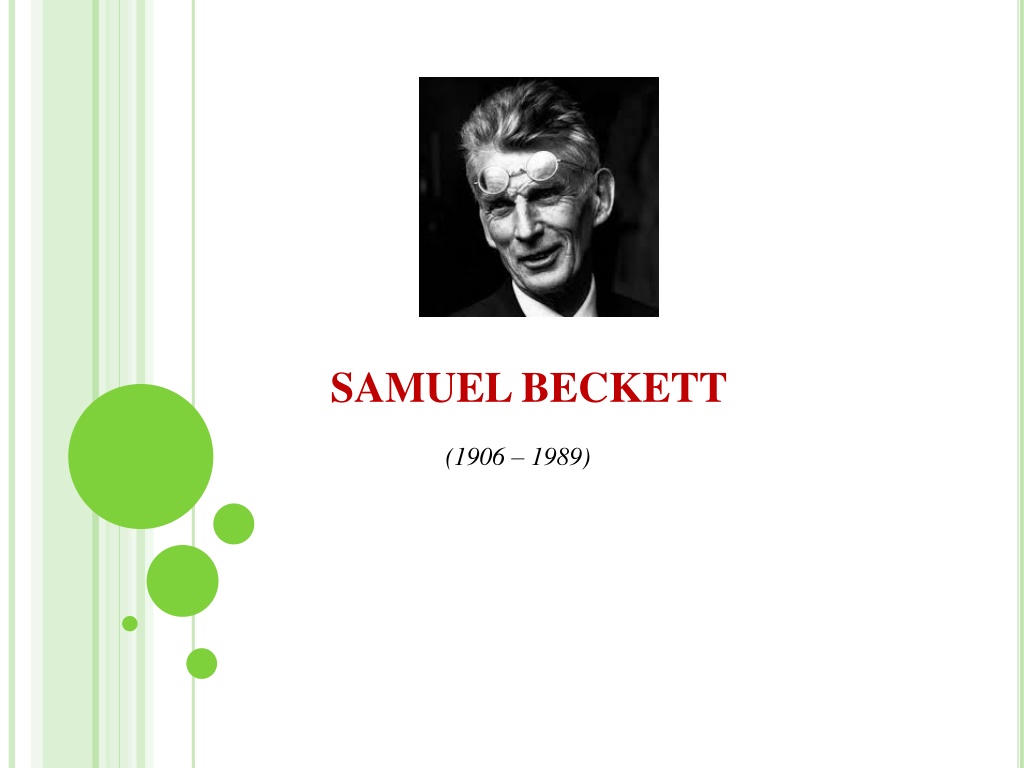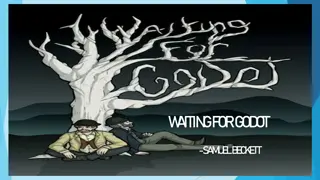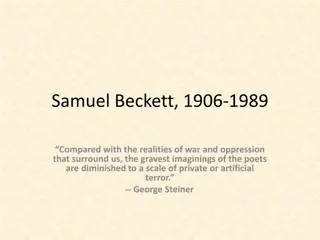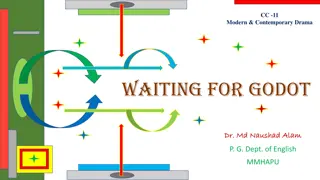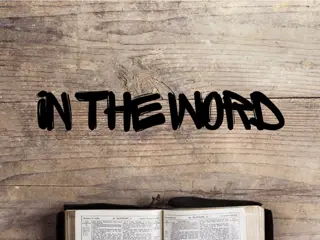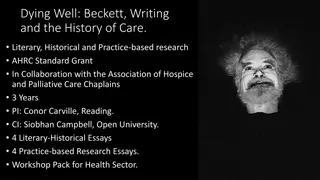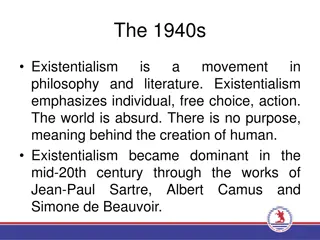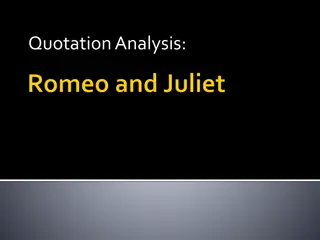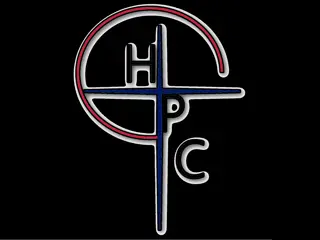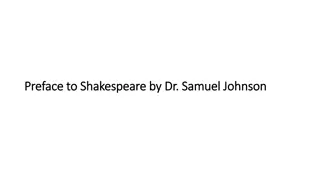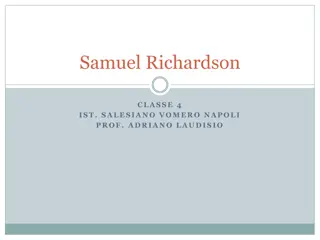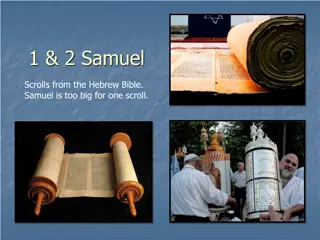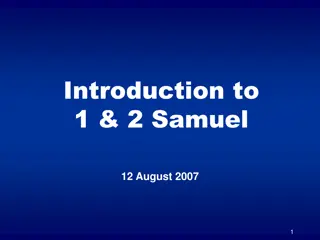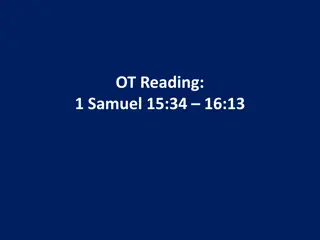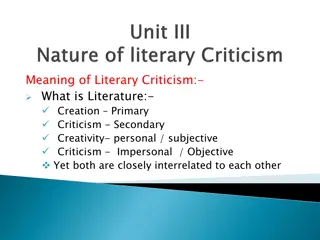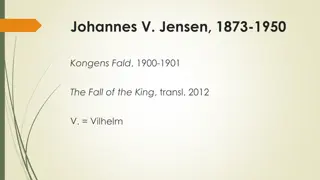The Life and Works of Samuel Beckett: A Literary Journey
Samuel Beckett, an Irish novelist, dramatist, and Nobel laureate, is known for his tragi-comedy and black humor in the Theatre of the Absurd. Born in Dublin in 1906, Beckett's notable works include "Waiting for Godot," "Endgame," and "Molloy." He joined the French Resistance during WWII and won the Croix de Guerre. Beckett's writing reflects themes of existentialism and human struggle. His legacy continues to influence modern literature.
Download Presentation

Please find below an Image/Link to download the presentation.
The content on the website is provided AS IS for your information and personal use only. It may not be sold, licensed, or shared on other websites without obtaining consent from the author. Download presentation by click this link. If you encounter any issues during the download, it is possible that the publisher has removed the file from their server.
E N D
Presentation Transcript
SAMUEL BECKETT (1906 1989)
BECKETTS PROFILE Date of Birth : 13th April 1906 (Good Friday) Place of Birth : Dublin, Ireland Nationality : Irish Place of Residence : Paris Professions : Novelist, Dramatist, Essayist, Short story Writer, Translator, Theatre Director Genres written : Tragi-comedy, Black Humour, Theatre of the Absurd Awards won : Nobel Prize for Literature (1969) Croix de Guerre (1945) Name of his spouse: Suzanne Date of his demise : 22nd Dec. 1989
LIFE LINE: 1. At 14, he went to Portora Royal School, the same school attended by Oscar Wilde. Referring to his childhood, he said, I had little talent for happiness. 2. 1927: Received Bachelor s degree from Trinity College 3. 1928: Became a devoted student of James Joyce 4. 1937: Settled in Paris 5. 1940: Nazi Germans occupied France 6. 1940 1942: Beckett joined the French Resistance and fought against the Nazi invasion 7. 1945: Awarded the Croix de Guerre for bravery during his involvement in the French Resistance 8. 1961: Married Suzanne 9. 1962: Awarded the Nobel Prize for Literature for his writing, which in new forms for the novel and drama in the destitution of modern man acquires its elevation.
NOTABLE WORKS OF BECKETT Collection of short stories: More Pricks than Kicks (1933) EssaysandReviews: Recent Irish Poetry (in The Bookman, Aug.1934) Humanistic Quietism (in The Dublin Magazine, July-Sept.1934) Novels: Murphy (1938) Watt (1953) How It Is (1960) Trilogyofnovels: Molloy (1951) Malone Dies (1958) The Unnamable (1960) Plays: Waiting for Godot (1953) Endgame (1957) Krapp s Last Tape (1958) Happy Days (1961) Poetry: Collected Poems in English and French (1977)
THEATRE OF THE ABSURD In (this) universe man feels a stranger. His is an irremediable exile This divorce between man and his life, constitutes the feeling of Absurdity. - Camus in The Myth of Sisyphus
THEATRE OF THE ABSURD Cut off from his religious, metaphysical and transcendental roots, man is lost; all his actions become senseless, absurd, useless. - Eugene Ionesco
THEATRE OF THE ABSURD Nothing happens, nobody comes, nobody goes, it s awful. - Waiting for Godot
THEATRE OF THE ABSURD Jean Paul Sartre and Albert Camus believe in the existentialist philosophy: Man is an isolated being who is cast ignominiously into an alien universe. Man s life moves from nothingness whence it came toward nothingness where it must end. Man s existence is both anguished and absurd.
THEATRE OF THE ABSURD Waiting for Godot is an absurd play, because: It is grotesquely comic. It is irrational. It parodies western culture. It parodies traditional drama. I has pointless funny dialogues. It projects metaphysical alienation. It expresses anguish.
Characters: Estragon Vladimir Lucky Pozzo Boy 1953 Place premiered: Theatre de Babylone, Paris
PARTS OF DRAMA CLIMAX FALLING ACTION RISING ACTION EXPOSITION / INTRODUCTION RESOLUTION / CONCLUSION FREYTAG S PYRAMID
INTRODUCTION Two shabby men Vladimir and Estragon are friends. They meet on the side of a country road near a leafless tree. They repent for unknown reason. They get bored; so they want to leave. They are waiting for Godot without knowing the reason. They want to hang themselves in order to pass time.
RISING ACTION Pozzo arrives with his slave Lucky. Pozzo abuses Lucky. He commands Lucky to dance and think. Lucky speaks in a jumbled manner. Others attack Lucky and make him stop. A boy arrives with a message from Godot that he ll not come in the evening . He ll come only the next day Next day, Vladimir and Estragon return. There are a few leaves on the tree. The men debate the value of thought.
CLIMAX Lucky and Pozzo arrive again. They are much different. Pozzo has gone blind. He relies on Lucky for guidance and support. Whenever Lucky falls down, Pozzo also falls down. Lucky and Pozzo are unable to get up. Vladimir and Estragon try to help them. Eventually they too fall down. Pozzo does not remember any of his meetings with Vladimir and Estragon.
FALLING ACTION A boy comes with a message from Godot: I cannot come tonight but will come tomorrow without fail. The boy has no memory of any previous meetings with Vladimir and Estragon.
RESOLUTION Night falls. Vladimir and Estragon decide to leave. They agree to wait for Godot the next day. But they do not move.
BECKETTS WORKS WAITING FOR GODOT 1952 ENDGAME 1957 HAPPY DAYS 1961 PLAY 1963 NOT I 1972 BREATH 1969 KRAPP S LAST TAPE 1958 WORSTWARD HO 1983 CASCANDO 1962 ACT WITHOUT WORDS I 1965 QUAD 1981 COME AND GO 1966 ROCKABY 1981 ALL THAT FALL 1957 EMBERS 1959 CATASTROPHE 1982 FOOTBALLS 1975 THAT TIME 1975
ELEUTHERIA 1995 WHAT WHERE 1983 GHOST TRIO 1975 EH JOE 1965 WORDS AND MUSIC - 1961 NACHT AND TRAUME 1982 A PIECE OF MONOLOGUE 1980 FROM AN ABANDONED 1957 OHIO IMPROMPTU 1981 ROUGH FOR THEATRE II ACT WITHOUT WORDS II 1956 ROUGH FOR RADIO II 1961 ..BUT THE CLOUDS - 1976 THE OLD TUNE 1963 ROUGH FOR RADIO I 1961 ROUGH FOR THEATRE I 1979
